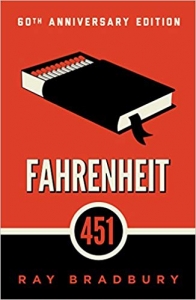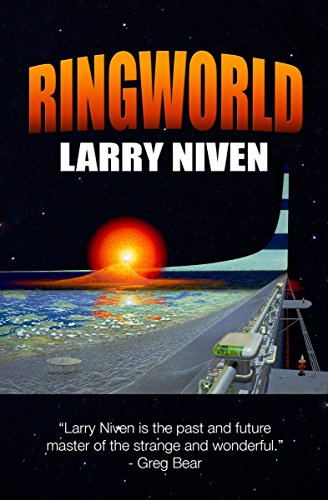
*Some book-related copy in this post was pulled from Amazon & Wikipedia.
One of his most famous works is Fahrenheit 451, a dystopian science-fiction novel in which television rules and literature is on the brink of extinction, since rather than putting fires out, firemen start them, and have burned almost all the books known to have existed. This kind of dystopic, societal-critique is a common theme in Bradbury's work, including in his many short stories.
We are so proud to have Anne McCaffrey (1926 – 2011) on this list as she is the only woman to have made this top 10 list… something we hope to see changing over the coming years as more female authors get exposure. McCaffrey held a 46-year career as a writer, and she became the first woman to win a Hugo Award for fiction and the first to win a Nebula Award.
The problem with E.E. Doc Smith is that a lot of his books are hard to find, and aren’t in the public eye. I read his books back in my youth and again just a few years ago.
6. H.G. Wells

I also like women writers, and I’m amazed that Loia McMaster Bujold is not included here.
Agreed. I nominated women, but they didn’t get enough votes. Women have found it harder to break into SF. Alice Sheldon had to start out writing ultramasculinely under a pseudonym, James Tiptree, Jr. The Golden Age of SF was aimed at 12 year old boys, so there are more grown boys voting based on what actually got published and pushed. Ursula K. Le Guin, Alice Sheldon, and others got cheated in this unscientific fictional poll.
I first read Asimov’s Foundation when I was registering for Hollywood High School. I loved Asimov but I thought he had no clue that women are not men in dresses. I still love Asimov!

Rate: $150 to $200 per assignment, typically 1,500 to 2,000 words.
Start with a question, and find out if it’s got science writing story potential. For example:
Who to pitch: Associate Editor Laura French. Pitch Editor-in-Chief Michelle Taylor when she returns from maternity leave in October 2018.
Who to pitch: Associate Nutrition Editor Julia Westbrook or another member of the editorial team.
4. Chatelaine Magazine

Pitch ideas about the merging of science and technology to advance forensic science, which may include the use of biometric data, DNA testing, toxicology reporting, or evidence collection and testing.
Recent stories by Humanosphere writers included the rise of cholera in East Africa linked to El Nino, the 12 deadliest bacteria on earth, results of clinical trials for a new malaria vaccine, and new technology that may make breathing the air in even the most polluted cities better.
“Our biggest piece of advice for selling us on a straight research story is this,” says Deputy Editor Barbara Jasny, “Pitch us hidden gems.”

Science writers interested in improving their skills can sign up for internships and workshops offered by professional societies and science magazines. They might also attend scientific conferences and professional meetings in order to make contacts, learn about advances in the field, and keep their technical skills up to date.
Because science writers use the computer for the majority of their work, they must learn a variety of computer software, including word processing, graphics, audio, video, and animation software. In fact, taking classes in photography and developing photography skills is a plus.
Of the many kinds of specialized writers, the science writer has a unique responsibility to the reader. Unlike the sportswriter, for example, whose reader already knows, often in extraordinary detail, the rules of the game and who the players are, science writers frequently introduce readers to a new "game" with every article. (Imagine if sportswriters had to assume that readers had little knowledge of football every time they wrote about the latest NFL game.) Science writers also have a sometimes difficult job of teasing out details and anecdotes to produce an attention-grabbing article, video, or radio segment that will draw casual readers or viewers into a topic they might not at first care much about.
Science writers and editors must be able to express ideas clearly and logically and should love to write. Creativity, curiosity, a broad range of knowledge, self-motivation, and perseverance also are valuable. Science writers and editors must demonstrate good judgment and a strong sense of ethics in deciding what material to publish. Editors also need tact and the ability to guide and encourage others in their work.
Key Facts & Information

Science writers must first understand the science, often the toughest part of the job. Then they must write the article—frequently in only an hour—translating it accurately into a form that is both interesting and intelligible to novices. Good science writers do their best to report accurately, but they always keep in mind what they think will interest the public—which may not be what the scientist thinks should interest the public.
The majority of science writers are not newspaper reporters. Some work on staffs of national magazines and Internet news services. Others write for special-interest medical and scientific publications. Many are freelancers, reporting and writing for a variety of media. And some work in broadcast media, ranging from network radio and television news programs to science-documentary production companies.
Science writers may work in comfortable, private offices or in noisy rooms filled with the sound of keyboards and computer printers as well as the voices of other writers tracking down information over the telephone. They may be required to sit for long periods of time. Because they must be precise and highly accurate, their search for information sometimes requires travel to diverse workplaces, such as factories, offices, or laboratories. Still, many science writers have to make do with telephone interviews, the library, and the Internet.

Freelancewriting.biz is giving you the opportunity to earn big bucks as a freelance science writer. This is a great opportunity for college students and scholars, who have the knowledge and the skills.
Are you looking for a job that pays you really well? People have a misconception that part-time and freelance writing jobs do not have a great salary structure. In fact, they feel that the salary is not fixed and there is no job security. Let us tell you one thing – there may not be a fixed salary, but with your writing skills, you can use it anywhere and everywhere.
– You are polishing your skills and knowledge as a writer on this platform! If you love Science, then this your chance to shine!
– The platform offers a lucrative and competitive salary. You would not get an opportunity like this! You get paid better than a full-time job!
Get decent freelance job

– The site is reliable, and you would get the payments in your account!
Do you enjoy doing Science projects? Do you enjoy writing about scientific novels and experiments? If the answer is a resounding YES, then this job opportunity is meant for you!
In order to join the platform, you would need to sign up and clear a basic test! It is a grammar test that you need to clear. Once you clear it, you can start your writing career!
Asimov is perhaps the most famous of “The Big Three of Science Fiction” and is one of the most prolific writers in sci-fi history. He published or edited over 500 books, and an estimated 90,000+ letters and postcards. He has published non-fiction as well as fiction, with books under every section of the Dewey decimal system except for philosophy. He is best known as a science and science fiction writer, whose Robot series and Foundation series laid the groundwork for most modern science fiction and are still widely read today.
Robert Heinlein was an extremely influential science fiction writer who may have been overshadowed in the long run by Isaac Asimov, but Heinlein is well known and loved among science fiction fans. He was both popular and controversial and he concentrated on “hard” science fiction — science fiction that took its science very seriously. He won four Hugo Awards for his novels, and along with Asimov and Clarke was known as one of “The Big Three of Science Fiction.” Talk about influence!
Douglas Adams may be one of the most popular authors on this list, and when his works first came out, they were very unique. Adams is best known for his “Hitchhiker’s Guide to the Galaxy” series, which was ground breaking. These works introduced a comedic and strange (maybe almost surreal) element to science fiction writing that is still adored by fans even today.
Verne’s writings made him the pioneer of science fiction, and one of its finest writers. He, in fact, published his first science fiction novels around the time H.G. Wells was born. “Journey to the Center of the Earth,” “20,000 Leagues Under the Sea,” and “Around the World in 80 Days,” are classics that changed fictional literature and gave birth to what would become the science fiction genre. Verne wrote incredibly detailed stories about space travel and submarines before any such travel on a large scale was practical, and he laid the foundation for arguably the greatest science fiction writer ever.
10 Meaningful Literary Moments That Were Lost In Translation
Orson Scott Card is the author of one of the most popular science fiction series in history. The Ender’s Game sagas rate right up there with Dune as one of the most popular series of books of all time, and certainly the most popular of modern times. If William Gibson is the father of Cyber-punk science fiction, then Orson Scott Card is the modern voice that set the direction of modern science fiction.
While most famous for writing his smash hit novel “Fahrenheit 451,” one of (if not the) greatest dystopian science fiction novel of all time, Bradbury wrote a lot of science fiction and fantasy and was a major influence to literally thousands of future science fiction writers. Not only was “Fahrenheit 451” one of the best science fiction novels of all time, but “Something Wicked This Way Comes,” “Dandelion Wine,” and “The Martian Chronicles” are all works that each were amazing enough to make an author’s career, and Bradbury was the author of all of them. It’s amazing he’s only #6, but this is a genre that has amazing number of giants.
Even before the “Dune” series was made into a mini-series for the Sci-Fi channel, this series of books had a huge and devout following that rivaled that of “The Lord of the Rings.” This great series took place over 1,000s of years, and originally consisted of the novel “Dune” and five sequels, although other related novels have been published by his son since then. This series is amazingly wide ranging, often dealing with themes like human survival, evolution, ecology, and the intersection of religion, politics, and power. “Dune” is thought to be the single best-selling sci-fi novel of all time.
William Gibson is an extremely popular and controversial science fiction writer who is known as the father of the modern “Cyber Punk” novel. While people and fans still argue over what kind of an influence Gibson has had on the science fiction genre, there’s no doubt his mark has been made. As one anonymous critic put it: “Whether he’s saved the genre or destroyed it, only time will tell.” A little bit overboard, but it gives an idea of the influence this author of “Johnny Mnemonic” and “Neuromancers” has had.
